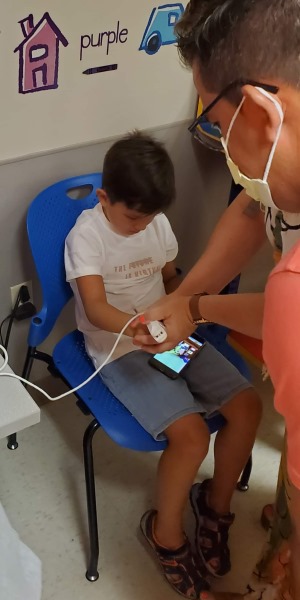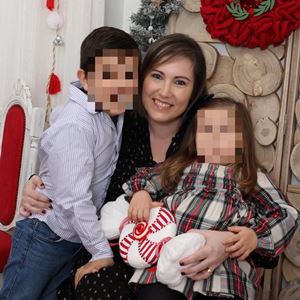You are here
Salvador’s Story: Expanded Access for Autism
This treatment was performed with the collaboration between BebéVida and Duke University.
 Salvador, a five-year-old Portuguese boy who was diagnosed with autism spectrum disorder, recently underwent treatment using stem cells from his own umbilical cord blood with the aim of improving his condition. The procedure was carried out in August 2022, at Duke University Hospital, in the United States of America (USA), within the scope of the Expanded Access Protocol (EAP) led by Prof. Joanne Kurtzberg, internationally renowned pioneer in the use of umbilical cord blood. It is estimated that, in Portugal, 1 in 1000 children of school age lives with autism spectrum disorder1. (Editor’s Note: At the end of 2022 the Expanded Access program stopped enrolling children with autism.)
Salvador, a five-year-old Portuguese boy who was diagnosed with autism spectrum disorder, recently underwent treatment using stem cells from his own umbilical cord blood with the aim of improving his condition. The procedure was carried out in August 2022, at Duke University Hospital, in the United States of America (USA), within the scope of the Expanded Access Protocol (EAP) led by Prof. Joanne Kurtzberg, internationally renowned pioneer in the use of umbilical cord blood. It is estimated that, in Portugal, 1 in 1000 children of school age lives with autism spectrum disorder1. (Editor’s Note: At the end of 2022 the Expanded Access program stopped enrolling children with autism.)
“Since Salvador underwent treatment, we have been experiencing several improvements, both at home and in school. We noticed that he is more attentive and concentrated and we hope that in the coming months the progress will be even more visible and significant”, says Liane, mother of the boy who lives with autism.
At the end of 2019, Liane, a professional nurse and mother of two boys, contacted Duke University, in North Carolina, as she was aware of the Expanded Access protocol that was running in parallel to the clinical trials being carried out for the diagnoses of autism spectrum and cerebral palsy with infusion of cord blood stem cells.
The two times she was a mother, Liane decided to cryopreserve umbilical cord blood stem cells through a Portuguese tissue and stem cell bank, BebéVida. “It was, in a way, this decision that motivated the hopeful contact with Duke University”, reflects Liane.
At the beginning of 2022, after much persistence, among several contact attempts over the last three years and several required medical reports, Salvador's mother finally managed to have Salvador's case accepted in the Expanded Access Protocol (EAP) at Duke University.
The cryopreservation laboratory, where Salvador's stem cells were stored since his birth, was contacted by Liane to release the sample. BebéVida sent the sample to the Pediatric Hospital of the Duke University of Medicine, following the most demanding storage conditions in order not to compromise the biological material. Weeks after the sample arrived in the US, the procedure was scheduled. The infusion of stem cells took less than an hour and, as there were no side effects in the first 24 hours, the boy was discharged and was able to return to Portugal.
The use of a biological product, that is, stem cells from umbilical cord blood, is an experimental clinical approach to the treatment of the autism spectrum. If the treatment is successful, it is expected that, about 6 to 12 months after the infusion of his own cord blood, the boy will show improvements in speech. The first assessment took place in February 2023, when 6 months have passed after the infusion.
 In recent years, several clinical trials have shown that the use of umbilical cord blood and tissue is not only a safe procedure, but also has therapeutic benefits in some children diagnosed with autism spectrum disorders. The benefits manifest in the reduction of clinical symptoms of the pathology, increased neuronal connectivity is seen, as well as behavioral and physiological improvements, such as social and communication skills.
In recent years, several clinical trials have shown that the use of umbilical cord blood and tissue is not only a safe procedure, but also has therapeutic benefits in some children diagnosed with autism spectrum disorders. The benefits manifest in the reduction of clinical symptoms of the pathology, increased neuronal connectivity is seen, as well as behavioral and physiological improvements, such as social and communication skills.
Cryopreservation consists of a simple procedure after the time of delivery, non-invasive and risk-free, painless for both the mother and the baby, which consists of collecting stem cells from umbilical cord blood, which are then properly stored while maintaining their original properties for many years.
It is estimated that 50,000 Portuguese have autism spectrum disorders2. According to the American Psychiatric Association, autism spectrum disorders are considered a neuro-behavioral syndrome originating from changes in the central nervous system that affect the normal development of the child3.
Autism is called a spectrum due to the variability of symptoms, from the mildest manifestations to the most severe forms, which can be distributed into three major domains of disturbance: social, behavioral, and communication. Symptoms usually occur in the first three years of life, however, they may not fully manifest until social interactions exceed the limit of the child's capabilities4. While there is no cure, behavioral therapy or medication or a combination of both can help improve daily performance.
References
- Oliveira, G. Epidemiologia do autismo em Portugal: Um estudo de prevalência da perturbação do espectro do autismo e de caracterização de uma amostra populacional de idade escolar. PhD thesis. (2005)
- Martins C. 50 mil portugueses têm perturbações do espectro do autism. Expresso.pt (2020)
- American Psychiatric Association. Diagnostic and statistical manual of mental disorders. 5th Edition. (DSM-5) Book published by APA Washington, DC. (2013)
- American Psychological Association. APA’s statement on the DSM-5 development process. (APA) Washington, DC. (2012)


